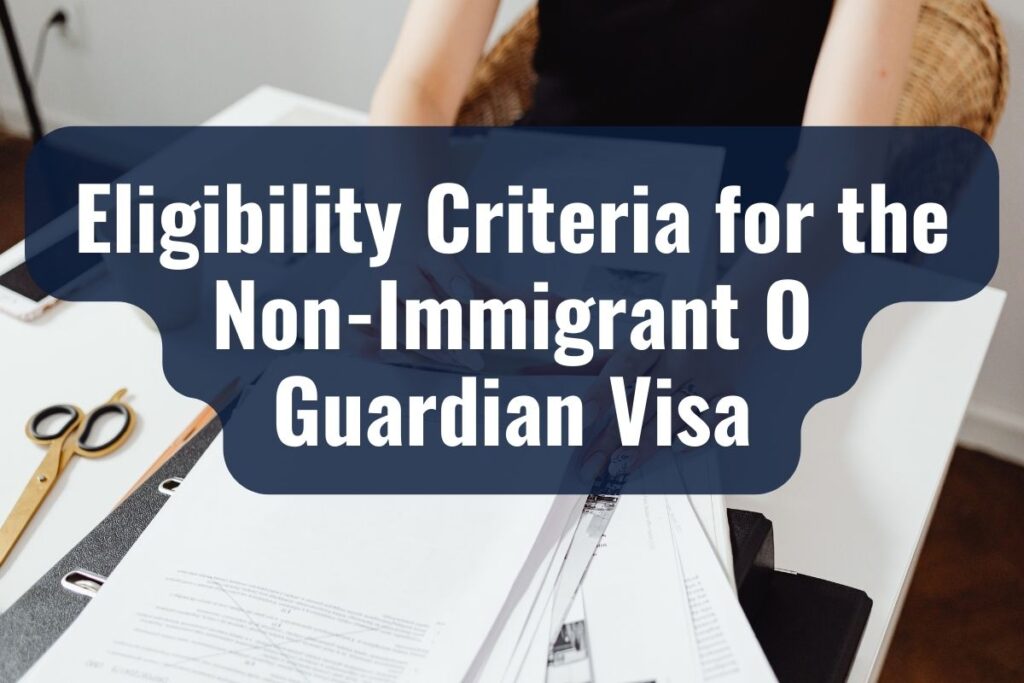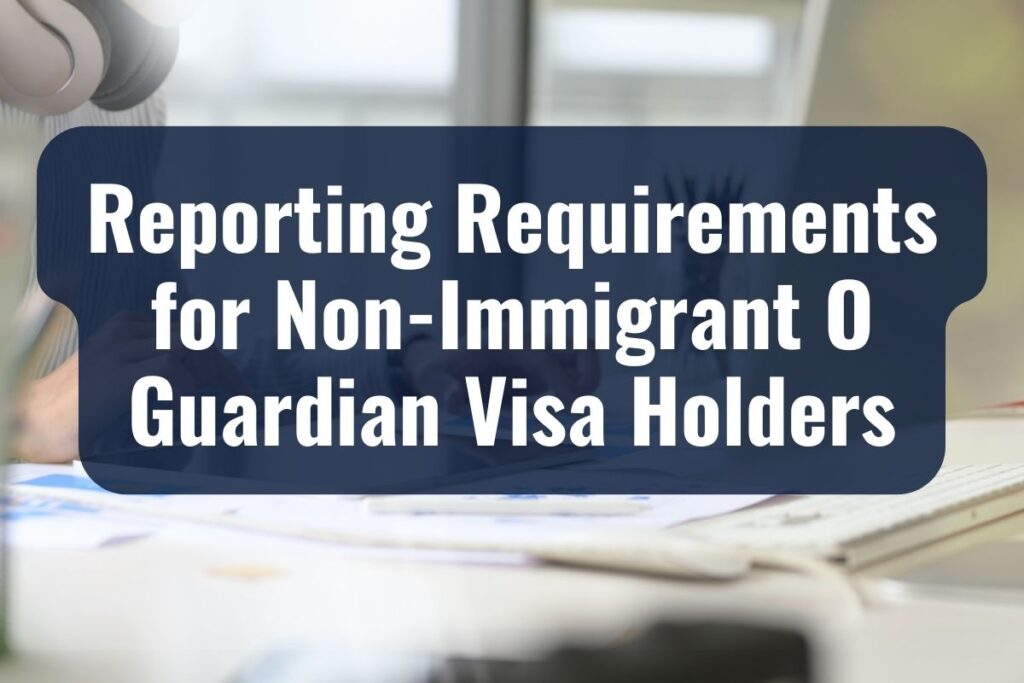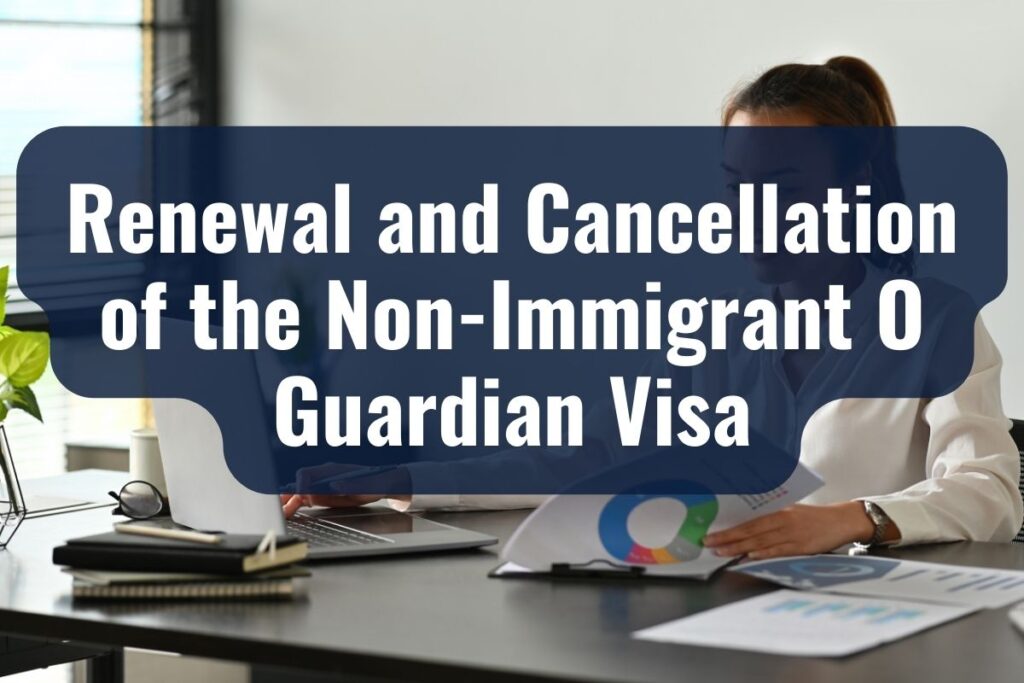Thailand is a popular destination for expatriates and foreign residents. Among the various visa options available for foreigners, the Non-Immigrant O Guardian Visa plays a crucial role for those who find themselves in the Kingdom, not just for tourism or business but as guardians to Thai residents or students.
The Non-Immigrant O Guardian Visa is specifically tailored for foreigners who need to stay in Thailand to take care of their family members, especially minors who are studying in Thai schools. It bridges the gap between short-term travel and long-term residency, offering a legal and structured pathway for guardians to live and support their dependents in Thailand.
KEY TAKEAWAYS
- The Non-Immigrant O (Guardian) Visa is for foreign guardians of Thai residents or students.
- Applicants must prove their guardianship status and financial stability.
- Required documents include a valid passport, proof of relationship, and financial evidence.
- The application process involves document submission and a visa fee payment.
- Visa fees vary; processing time ranges from days to weeks.
- Visa holders can reside but not work in Thailand; compliance with restrictions is essential.
- Regular 90-day reporting to Thai immigration is mandatory.
What is the Non-Immigrant O Guardian Visa?
The Non-Immigrant O Guardian Visa is a type of visa issued by the Kingdom of Thailand to foreign nationals who are staying in the country as guardians to Thai residents or students. This visa category is particularly designed for parents or legal guardians of Thai children or children studying in Thailand.
Purpose of the Guardian Visa
The primary purpose of this visa is to provide a legal means for foreign guardians to reside in Thailand for extended periods. It acknowledges the need for parents or guardians to be physically present in Thailand to take care of their dependents, particularly when these dependents are minors or enrolled in educational institutions in the country.
Key Characteristics
- Target Group: This visa is typically issued to parents or guardians of Thai citizens or foreign children enrolled in Thai schools.
- Nature of Stay: It is intended for those who wish to stay in Thailand for longer than the period allowed by tourist visas but do not qualify for other types of long-term visas.
- Activities Allowed: Holders of the Guardian Visa are permitted to live in Thailand but are generally not allowed to engage in employment without obtaining a work permit.
Eligibility Criteria for the Non-Immigrant O Guardian Visa

To be eligible for the Non-Immigrant O Guardian Visa, applicants must meet specific criteria set by the Thai government. These requirements are designed to ensure that the visa is granted to genuine guardians who have a legitimate need to stay in Thailand. Understanding and fulfilling these criteria is crucial for a successful visa application.
Primary Requirements
Relationship to the Dependent: Applicants must be the parent or legal guardian of a Thai resident or a foreign child studying in Thailand. Proof of relationship, such as birth certificates or legal guardianship documents, is required.
Age of the Dependent: The child or dependent must typically be under 20 years of age. Exceptions might apply in special circumstances.
Educational Status of the Dependent: The dependent should be enrolled in a recognized educational institution in Thailand. Evidence of enrollment, such as a letter from the school, is necessary.
Financial Stability: Applicants must demonstrate financial capability to support themselves and their dependents during their stay in Thailand. This might involve showing bank statements or other financial documents.
Additional Considerations
- Health and Character Requirements: Applicants should be in good health and have no criminal record. Health certificates and police clearance may be requested.
- Immigration History: A favorable immigration history, such as prior compliance with Thai visa regulations, can be beneficial.
Required Documentation for the Non-Immigrant O Guardian Visa Application
Securing a Non-Immigrant O Guardian Visa involves presenting a series of documents to the Thai immigration authorities. These documents are essential to verify your eligibility and support your visa application. Accurate and complete documentation is key to a smooth application process.
| Document Type | Description |
| Passport | Valid for 6+ months beyond stay period. |
| Visa Application Form | Duly completed and signed. |
| Photographs | Recent passport-sized, as per specifications. |
| Proof of Relationship | Birth certificates, guardianship documents. |
| School Documentation | Confirmation of dependent’s enrollment. |
| Financial Evidence | Bank statements or other financial documents. |
| Accommodation Proof | Evidence of accommodation in Thailand. |
| Health Insurance | Valid health insurance for the duration of the stay. |
Essential Documents
- Passport: A valid passport with a minimum validity of 6 months beyond the intended period of stay in Thailand.
- Visa Application Form: A duly completed and signed visa application form, specific to the Non-Immigrant O Guardian category.
- Photographs: Recent passport-sized photographs adhering to the specifications set by the Thai consulate or embassy.
- Proof of Relationship: Documents proving your relationship to the dependent, such as birth certificates, adoption papers, or legal guardianship documents.
- School Documentation: Official confirmation of the dependent’s enrollment in a Thai educational institution, such as a letter from the school.
- Financial Evidence: Bank statements or other financial documents demonstrating sufficient funds to support yourself and your dependent(s) in Thailand.
- Accommodation Proof: Evidence of accommodation in Thailand, like rental agreements or property ownership documents.
- Health Insurance: Valid health insurance covering the duration of your stay in Thailand, if required.
Additional Documents
- Police Clearance Certificate: From your home country or the country of your last residence to prove that you have no criminal record.
- Medical Certificate: A health certificate from a recognized medical institution confirming that you are free from certain contagious diseases.
Application Process for the Non-Immigrant O Guardian Visa

Navigating the application process for the Non-Immigrant O Guardian Visa is a critical step in securing your stay in Thailand as a guardian. This process involves several stages, from gathering the necessary documents to submitting your application at the appropriate Thai authorities. Following these steps methodically will help ensure a smooth application experience.
Step-by-Step Application Guide
- Document Preparation: Begin by gathering all the required documentation listed in the previous section. Ensure that each document is current, accurate, and meets the specifications set by the Thai immigration authorities.
- Visa Application Form: Obtain the visa application form from the nearest Thai embassy or consulate or download it from their official website. Fill out the form completely and accurately.
- Submission of Application: Submit your completed application form along with all the required documents to the Thai embassy or consulate in your home country. Some locations may allow or require online submission or booking an appointment for submission.
- Payment of Visa Fee: Pay the applicable visa fee at the time of application submission. The fee can vary depending on your country and the duration of the visa, so it’s important to verify the exact amount beforehand.
- Application Review and Processing: Once your application is submitted, it will undergo a review process. This can take several days to weeks, depending on the embassy’s workload and specific circumstances.
- Visa Approval and Collection: If your application is approved, you will be notified to collect your visa. Some embassies may offer the option to have the visa mailed to you.
- Entry into Thailand: After obtaining your visa, you can travel to Thailand. Ensure that you carry all necessary documents as you may need to present them at the immigration checkpoint upon arrival.
Tips for a Successful Application
- Check Local Requirements: Embassy-specific requirements can vary, so it’s advisable to check with the Thai embassy or consulate in your home country for any specific instructions or additional requirements.
- Apply Well in Advance: To avoid any unforeseen delays, submit your application well before your planned travel date.
- Keep Copies of All Documents: It’s wise to keep copies of all submitted documents, including the receipt of the visa fee payment, for your records.
Visa Fees and Processing Time for the Non-Immigrant O Guardian Visa
A critical aspect of planning for your Non-Immigrant O Guardian Visa application is understanding the associated costs and the time frame for processing. Being aware of these factors helps in effectively managing your application timeline and budget.
Visa Fees
The cost of the Non-Immigrant O Guardian Visa varies depending on several factors such as your nationality, the location of the Thai embassy or consulate, and the duration of the visa. Generally, the fees can be categorized as follows:
- Single-Entry Visa Fee: This fee applies if you plan to enter Thailand once. The visa is valid for a certain period, typically 3 months, from the date of issue.
- Multiple-Entry Visa Fee: A higher fee for those who wish to have the flexibility of multiple entries into Thailand during the validity of the visa, which is usually 1 year.
It’s important to note that these fees are subject to change and may differ slightly from one country to another. Therefore, it is advisable to check the current fee structure with the Thai embassy or consulate where you plan to submit your application.
Processing Time
The time taken to process a Non-Immigrant O Guardian Visa application can vary significantly based on several factors:
Embassy/Consulate Workload: The processing time can be affected by the volume of applications being handled by the specific Thai embassy or consulate.
Completeness and Accuracy of Application: Applications that are complete and free from errors are processed more quickly. Incomplete or incorrect applications may face delays.
Individual Circumstances: Certain individual factors, such as the applicant’s nationality or previous immigration history, can influence processing times.
On average, the processing time ranges from a few days to several weeks. Applicants are advised to apply well in advance of their intended travel date to account for any unexpected delays.
Validity and Extensions for the Non-Immigrant O Guardian Visa

Understanding the validity period of the Non-Immigrant O Guardian Visa and the options for extensions is crucial for planning your stay in Thailand. This knowledge helps in ensuring compliance with Thai immigration laws and in making informed decisions about your stay duration.
Visa Validity
The validity of the Non-Immigrant O Guardian Visa varies depending on the type issued:
- Single-Entry Visa: Typically valid for 3 months from the date of issue. It allows a single entry into Thailand with the stay duration determined by the immigration officer, usually up to 90 days.
- Multiple-Entry Visa: Generally valid for 1 year from the date of issue. Each entry into Thailand during this period permits a stay of up to 90 days.
Visa Extensions
Visa extensions are possible under certain circumstances and are subject to approval by the Thai immigration authorities. To extend your stay, you need to apply before your current visa or stay permit expires. The process involves:
- Application for Extension: Submitting an extension application at a Thai immigration office.
- Required Documentation: Providing documents similar to those for the initial visa application, including proof of ongoing guardianship responsibilities.
- Extension Fee: Paying a fee for the visa extension. The amount is subject to change and should be verified with the immigration office.
Extensions are typically granted for a period of up to 1 year at a time, depending on your circumstances and compliance with the visa terms.
Important Considerations
- Timely Application: It’s crucial to apply for an extension before your current visa or permitted stay expires to avoid overstay penalties.
- Continuous Guardianship: Extensions are contingent on the ongoing guardianship role. Changes in guardianship status can affect extension eligibility.
- Compliance with Thai Laws: Adhering to the visa conditions and Thai laws is essential for extension approvals.
Rights and Restrictions of the Non-Immigrant O Guardian Visa Holders
Holders of the Non-Immigrant O Guardian Visa in Thailand are granted specific rights, but they also need to be aware of certain restrictions. Understanding these parameters is crucial for maintaining legal status and making the most out of your stay in Thailand.
Rights of Visa Holders
Residence: The primary right granted by this visa is the ability to reside in Thailand for the duration of the visa’s validity, to fulfill guardianship duties.
Travel within Thailand: Visa holders are free to travel within the country.
Renewal and Extension: Subject to meeting the eligibility criteria, visa holders can apply for renewals or extensions to prolong their stay in Thailand.
Restrictions and Limitations
- Employment: Holders of the Non-Immigrant O Guardian Visa are generally not permitted to work in Thailand. Obtaining employment requires a separate work permit and possibly a change to an appropriate visa category.
- Business Ownership: Engaging in business activities or owning a business is not allowed without the proper visa and permits.
- Duration of Stay: Each entry into Thailand under this visa is typically limited to a maximum of 90 days, which can be extended under certain conditions.
- Reporting Requirements: Depending on the duration of stay, visa holders may be required to report their residence to Thai immigration every 90 days.
- Change of Status: If the circumstances of your guardianship change (e.g., if the child completes their education or leaves Thailand), your visa status may need to be reassessed.
Compliance is Key
Abiding by Visa Conditions: It is imperative to comply with all conditions and limitations of the visa to avoid legal complications.
Staying Informed: Visa policies and regulations can change. Staying informed about any updates or modifications in Thai immigration laws is important.
Understanding your rights and adhering to the restrictions of the Non-Immigrant O Guardian Visa are fundamental aspects of your legal stay in Thailand. It ensures that you can fulfill your guardianship responsibilities without encountering legal difficulties.
Reporting Requirements for Non-Immigrant O Guardian Visa Holders

Adhering to reporting requirements is a crucial aspect of maintaining your Non-Immigrant O Guardian Visa status in Thailand. These requirements are designed to keep the Thai immigration authorities updated on your residence and ensure that you are complying with the terms of your visa.
90-Day Reporting
What is 90-Day Reporting?: Non-Immigrant O (Guardian) Visa holders are required to report their address and stay in Thailand to the immigration authorities every 90 days. This is applicable if you are in the country for a continuous period exceeding 90 days.
How to Report: There are several ways to complete the 90-day reporting:
- In Person: You can report to the nearest immigration office. This method requires you to bring your passport and a completed TM47 form.
- By Mail: You can send the required documents to the immigration bureau by registered mail.
- Online Reporting: Some regions offer online reporting through the Thai immigration website. This service is subject to availability and may have specific conditions.
Documents Required: Generally, you will need your passport, a copy of the visa page, a copy of the arrival/departure card (TM6), and the TM47 form.
Consequences of Non-Compliance
Penalties: Failing to comply with the 90-day reporting requirement can result in fines. Repeated non-compliance might lead to more serious consequences regarding your visa status.
Record of Compliance: Maintaining a consistent record of timely 90-day reporting is beneficial, especially if you plan to apply for visa renewals or other immigration-related services.
Tips for Timely Reporting
- Set Reminders: Keep track of your reporting dates and set reminders to ensure you report on time.
- Keep Documentation: Retain copies of your reporting confirmation or receipts as proof of compliance.
Common Issues and Solutions for Non-Immigrant O Guardian Visa Holders
Navigating the complexities of the Non-Immigrant O Guardian Visa can sometimes lead to challenges. Being aware of these common issues and knowing how to address them can make your experience as a visa holder smoother and more stress-free.
Issue 1: Delays in Visa Processing
- Problem: Applicants may experience delays in the processing of their visa applications.
- Solution: Ensure all documents are complete and accurate before submission. Follow up with the embassy or consulate if there is an unusual delay. Applying well in advance of your planned travel date can also mitigate the impact of any delays.
Issue 2: Meeting Financial Requirements
- Problem: Demonstrating the required financial stability can be challenging for some applicants.
- Solution: Prepare your financial documents well in advance. Make sure your bank statements clearly show the necessary funds. If you’re relying on income from abroad, provide evidence of regular income transfers to Thailand.
Issue 3: 90-Day Reporting Confusion
- Problem: New visa holders often find the 90-day reporting process confusing or forget to comply.
- Solution: Familiarize yourself with the reporting process and set up reminders. Consider the online reporting option if available, or visit the immigration office in person to ensure compliance.
Issue 4: Extension and Renewal Misunderstandings
- Problem: Misunderstandings regarding the extension and renewal process can lead to overstaying or improper visa status.
- Solution: Seek clear information from the Thai immigration office or a reliable legal source. Always start the renewal or extension process well before your current visa expires.
Issue 5: Change in Guardianship Circumstances
- Problem: Changes in your guardianship situation (such as the dependent finishing school) can affect your visa status.
- Solution: Inform the immigration authorities of any significant changes in your circumstances. You may need to modify your visa type or leave Thailand if your guardianship duties cease.
Seeking Assistance
When encountering difficulties, don’t hesitate to seek assistance. The Thai immigration office, legal advisors specializing in immigration law, and expatriate forums can be valuable resources for resolving issues related to your Non-Immigrant O Guardian Visa.
Being proactive and informed can help you navigate these common issues effectively, ensuring a compliant and enjoyable stay in Thailand.
Renewal and Cancellation of the Non-Immigrant O Guardian Visa

For holders of the Non-Immigrant O Guardian Visa in Thailand, understanding the procedures for renewal and the conditions that may lead to cancellation is crucial. This knowledge ensures that you can maintain your visa status effectively and are aware of actions that might jeopardize it.
Visa Renewal Process
- Eligibility for Renewal: To be eligible for visa renewal, you must continue to meet the initial visa requirements, including ongoing guardianship of a Thai resident or student.
- Application Timeline: Start the renewal process before your current visa expires. Late applications can lead to complications, including the possibility of overstaying.
- Required Documentation: Similar to your initial application, you’ll need to submit updated documents, such as proof of continued guardianship, financial stability, and any other documents required by the Thai immigration authorities.
- Application Submission: Submit your renewal application along with the required documents to the Thai immigration office. Ensure all information is current and accurate to avoid delays.
- Fee Payment: Pay the renewal fee, which may vary based on your nationality and the length of the visa extension.
Visa Cancellation Conditions
- Violation of Visa Terms: Engaging in activities not permitted by the visa, such as unauthorized employment, can lead to its cancellation.
- Change in Circumstances: Significant changes, such as the end of your guardianship role or the dependent leaving Thailand, can render the visa invalid.
- Overstaying: Overstaying your visa’s validity can lead to cancellation and possible penalties, including fines or a ban from re-entering Thailand.
Maintaining Compliance
- Stay Informed: Keep up to date with any changes in Thai immigration policies that may affect your visa status.
- Timely Action: Address renewal and any changes in your circumstances promptly to maintain your legal status in Thailand.
Seeking Assistance for Non-Immigrant O Guardian Visa-Related Matters
Navigating the complexities of obtaining and maintaining a Non-Immigrant O (Guardian) Visa in Thailand can sometimes require additional assistance. Knowing where to seek reliable and professional help can be invaluable in ensuring a smooth experience with your visa-related matters.
Sources of Assistance
- Thai Immigration Offices: For the most accurate and up-to-date information on visa policies and procedures. They can assist with application guidelines, document requirements, and clarification of laws and regulations.
- Legal Advisors and Immigration Lawyers: Professionals specializing in immigration law can provide personalized advice, especially for complex situations or if you encounter legal issues.
- Thai Embassies and Consulates Overseas: Useful for initial visa applications, information on specific requirements for your nationality, and guidance on consular services.
- Expatriate Forums and Communities: Online forums and expat communities can be a good source for shared experiences and practical advice from those who have gone through similar processes.
When to Seek Assistance
- Complex Cases: If your situation involves complex legal matters or unusual circumstances.
- Application Difficulties: If you encounter challenges during the application or renewal process.
- Legal Issues: In cases of visa denial, potential overstay, or other legal concerns.
- Changes in Circumstances: If there are significant changes in your guardianship status or personal circumstances that could affect your visa.
Tips for Seeking Assistance
- Choose Reputable Sources: Ensure that the advice or assistance you seek comes from credible and knowledgeable sources.
- Understand the Limitations: While forums and peer advice can be helpful, they should not replace professional legal advice where necessary.
- Prepare Your Questions: To make the most out of your consultations, prepare specific questions or concerns you have about your visa situation.
Related: Interesting Things to Do in Thailand: Must Try’s
FAQs
Can I work in Thailand with a Non-Immigrant O Guardian Visa?
No, the Non-Immigrant O Guardian Visa does not permit employment in Thailand. To work, you would need to obtain a work permit and possibly change to a visa category that allows employment.
Is it possible to apply for this visa while I’m already in Thailand?
Yes, you can apply for a change of visa type to a Non-Immigrant O Guardian Visa from within Thailand, provided you meet all the requirements. This process involves a visit to a Thai immigration office.
How much money do I need to show for the financial requirement?
The financial requirement varies and is subject to change. Typically, you need to show evidence of sufficient funds to support yourself and your dependents during your stay. It’s best to check the current requirements with the Thai embassy or immigration office.
Can my Non-Immigrant O Guardian Visa be converted to a different type of visa?
In some cases, it may be possible to change your visa type, depending on your circumstances and eligibility for other visa categories. This requires a separate application and approval from the Thai immigration authorities.
What happens if my dependent finishes their education or leaves Thailand?
If your dependent no longer requires guardianship in Thailand (e.g., they complete their education or leave the country), your eligibility for the Guardian Visa may cease. You should inform the immigration authorities and may need to change your visa type or leave Thailand.
Are there any specific health insurance requirements for this visa?
Health insurance requirements can vary. While it’s not always a mandatory requirement, having health insurance is advisable. Check the latest requirements with the Thai embassy or immigration office.
What should I do if I lose my passport while on a Guardian Visa?
If you lose your passport, report it immediately to your embassy and the Thai police. You will need to obtain a replacement passport and have your visa transferred to the new passport by the Thai immigration authorities.


